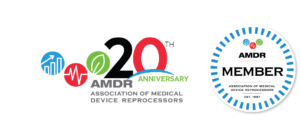

WASHINGTON, D.C. – November 2, 2018 – Today the Association of Medical Device Reprocessors (AMDR) announces the addition of Cardinal Health to its membership roster. The global trade association AMDR represents the regulated, commercial single-use medical device (SUD) reprocessing industry, and its growing membership base indicates the increasing value of reprocessing in healthcare. Reprocessing plays a crucial role in helping hospitals reduce costs and improve patient care. By participating in AMDR, member companies demonstrate their commitment to grow reprocessing in volume and scope and to increase the responsible and safe reuse of medical devices.
Headquartered in Dublin, Ohio, Cardinal Health, Inc. is a global, integrated healthcare services and products company providing customized solutions for hospitals, health systems, pharmacies, ambulatory surgery centers, clinical laboratories and physician offices worldwide.
Founded in 2015, the Sustainable Technologies division of Cardinal Health is a leading provider of SUD collection, reprocessing and recycling services in the United States. As a trusted partner to more than 1,400 hospitals, Cardinal Health Sustainable Technologies is committed to simplifying the supply chain, providing additional value to customers and reducing the impact of healthcare delivery on the environment — without compromising patient care or safety. As a member of AMDR, Cardinal Health will work collaboratively with other AMDR members to shape industry policy.
Cardinal Health Sustainable Technologies has developed a zero waste to landfill operation. All SUDs collected from healthcare facilities are reprocessed or recycled when they reach end of life. In 2017, Cardinal Health and their sustainability partners diverted over 740 tons of used medical devices from landfills.
“AMDR works to better align the medical device industry with the fundamental interests of hospitals and healthcare providers by making device reprocessing a key supply chain strategy for all hospitals. Cardinal Health joins other reprocessors and AMDR in its commitment to align with hospital interests, and work toward better transparency and accountability in the healthcare supply chain so that hospitals can make informed decisions and maximize the value of the medical device assets they own,” said Dan Vukelich, president and CEO of AMDR. “Further, use of regulated reprocessed devices ensures the highest possible quality and lowers overall cost per device use ….. enabling hospitals to access new technologies and serve a growing patient population.”
Medical device reprocessing and its value to healthcare systems have grown tremendously. In the United States alone, reprocessing has grown from a 20 million dollar industry in 2000 to more than an estimated half billion dollar industry today. AMDR members now serve the majority of U.S. hospitals, including 95 percent of the nation’s Honor Roll hospitals as ranked by U.S. News & World Report.
In representing the commercial SUD reprocessing industry, AMDR promotes reprocessing as an important strategy to reduce healthcare cost and waste. AMDR members reprocess — or clean, test, inspect, remanufacture and sterilize — SUDs. SUD reprocessing is strictly regulated by the U.S. Food and Drug Administration. AMDR members are FDA quality system or ISO 13485 compliant and meet other internationally recognized standards.
Having played a key role in establishing reprocessing, AMDR protects the industry’s interests and continues to promote the medical technology industry in general. It leads the way for reprocessing to play a defining role in the evolution and utilization of new medical device technologies.
For more information on Cardinal, please visit cardinalhealth.com or contact at GoGreen@cardinalhealth.com. For information on the Association of Medical Device Reprocessors, AMDR, please visit www.amdr.org or write Dan Vukelich at dvukelich@amdr.org.
###
